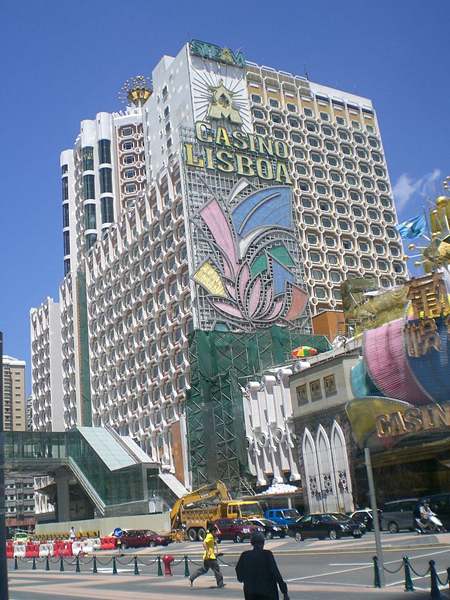Macao's waning casinos
- By Zhang Lulu
 0 Comment(s)
0 Comment(s) Print
Print E-mail China.org.cn, January 7, 2015
E-mail China.org.cn, January 7, 2015
|
Casino Lisboa created Stanley Ho, Macao's richest man and the "King of Gambling," and also become a landmark building in Macao. [File photo] |
If you take a walk from the landmark Ruins of St. Paul's in Macao along the Avenida do Infante D. Henrique, you will find a cylindrical structure in front of you. Despite being overshadowed by the magnificent Grand Lisboa standing opposite to it, the structure still attracts a lot of tourists as it houses the famous Casino Lisboa. Since its establishment in 1970, the casino created Stanley Ho, Macao's richest man and the "King of Gambling;" it has also become a landmark building in Macao.
With only 31 square kilometers and a population of half a million, Macao has developed a gaming industry with a history of more than 160 years. Gambling contributes 80 percent to Macao's taxes. In 2006, gambling revenue in Macao overtook that of Las Vegas, making the Chinese territory the world's largest gambling city. In 2013, gambling revenue in Macao reached 360.75 billion patacas (US$ 45.2 billion then), about seven times that of Las Vegas.
But the industry began to decline in 2014. Statistics show that the revenue was 24.269 billion patacas (about US$3.04 billion) in November, a year-on-year decrease of 19.6 percent. This is the sixth consecutive monthly decrease this year and the third consecutive monthly double-digit decrease, as well as the worst performance in five years.
Half empty VIP parlors
The halls of the six major casinos in Macao are still swarming with people, but the VIP rooms are less busy.
"The VIP rooms were rarely empty in the past, but now it is common [that the rooms are empty], sometimes half of them are empty," a gambling agent named Wilson told the China Economic Weekly.
Statistics show that VIP rooms contribute as much as two thirds of the entire revenue of gambling industry in Macao. Casinos have an entry threshold for VIP room players, and about 90 percent of the gamblers there are recommended by agents. The players usually do not have to use cash, but are provided with money by agents or the casinos. They also enjoy top-class services, including free accommodation, two-way flight tickets and other perks.
Nevertheless VIP revenue fell in all the major casinos in Macao in 2014, dropping by 16 percent year on year from June to August. Galaxy Entertainment Group reported a 23 percent less profit from its gaming business in the second quarter, compared to the first quarter.
Though there is no established link, industry insiders believe that the contracting VIP business is mainly affected by the anti-corruption campaign led by China's central government. A person in charge of the VIP rooms in the Venetian Macao, one of the six largest casinos in Macao, said that mainland visitors have become the major source of casino gambling since 2003 when China allowed individuals to visit Macao.







Go to Forum >>0 Comment(s)